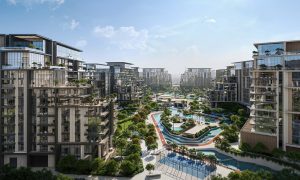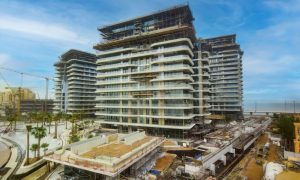Kleindienst Group says The Heart of Europe will be the world’s most sustainable tourism project
Phase 1 of the US$5 billion project located on The World Islands off the coast of Dubai is slated for completion in Q4 2020

Developer Kleindienst Group claims the combination of “micro jungles, hanging gardens, a rainforest, an expanded marine habitat and coral reefs, zero discharge policy, sustainable transportation and solar-powered electricity will make the Heart of Europe the most sustainable tourism destination in the world”.
Phase 1 of the US$5 billion project which is currently under construction on the man-made The World Islands arhcipelago off the coast of Dubai is slated for completion in the fourth quarter of 2020.
The phase includes the development of nearly 600 units (4,000 are planned for the development in total) across five key projects including eight Sweden Beach Palaces, 32 luxury villas on the Germany Island, Honeymoon Island – home to The Floating Seahorse, Portofino family hotel with over 170 family suites, and over 370 deluxe suites in the Côte d’Azur resort on the Main Europe Island.
Updating on progress in a report, Kleindienst confirmed that the handover processes will start upon getting necessary permission from the authorities, depending on the Covid-19 pandemic situation. In order to add to the attractions and make the project more sustainable and more ‘European’, the project introduces some unique feature
The Heart of Europe is being developed on six of those islands – bringing the best of European culture, heritage and experience in Dubai, says Kleindienst.
According to the developer, green living walls will add to the hotel biodiversity as it will attract bees, butterflies and birds whilst keeping the building cooler and reducing the hotels’ overall carbon footprint. It added in its briefing: “The series of micro-jungles, vertical hanging gardens, rainy street offering cool shower during the hot summer season, solar power, re-creation of coral reefs and expansion of marine habitat, solar-powered hotel suites that are backed with a ‘Zero discharge policy’ – are some of the key features that will set the Heart of Europe apart from all other tourism projects in the world.”
Work on the project started in 2008 and its targeting of being the world’s first ‘Zero Discharge’ resort was almost impossible on an island tourism destination and unthinkable a few years ago, said Josef Kleindienst, chairman, Kleindienst Group.
“However, it is becoming a reality now, thanks to the development of environmental engineering and technology. We are now able to achieve zero discharge at the Heart of Europe,” he added.
“Once completed, it will be the world’s first sustainable island tourism destination with a ‘Zero discharge’ policy. This means, there will be no discharge into the sea waters! When we purchased the islands, the guidelines were simple – to build world-class touristic assets – to attract tourists to Dubai. Since then, the authorities have strengthened the engineering guidelines that will make projects environmental sustainability.
“As a developer, we have gone extra miles to make sure we not only fulfil those sustainability regulations, but exceed them. For example, our civil structures are built to last more than 100 years, although the regulation is for a 50-year building life.
“So, we have exceeded our environmental and sustainability requirements as a project developer. Moreover, all our projects are green and will be surrounded by sustainable landscape, vegetation, micro-jungles that are watered through underground piping system to maximise the utilisation of the water resources. The abundance of trees and plants in the micro-jungles will attract seasonal birds and become home to butterflies.”

























